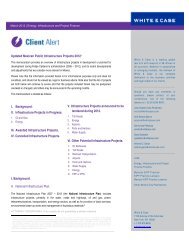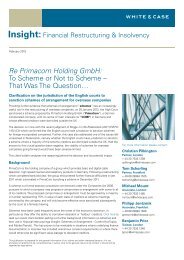Mexican Legal Framework of Business Insolvency - White & Case
Mexican Legal Framework of Business Insolvency - White & Case
Mexican Legal Framework of Business Insolvency - White & Case
You also want an ePaper? Increase the reach of your titles
YUMPU automatically turns print PDFs into web optimized ePapers that Google loves.
96<br />
■■<br />
■■<br />
Extending any previously granted relief.<br />
Granting any additional relief that may be available to the visitor, conciliator or<br />
receiver under the laws <strong>of</strong> Mexico.<br />
Upon recognition <strong>of</strong> a foreign proceeding, whether main or non-main, the judge<br />
may, at the request <strong>of</strong> the foreign representative, entrust the distribution <strong>of</strong> all or<br />
part <strong>of</strong> the debtor’s assets located in Mexico to the foreign representative or another<br />
person designated by Ifecom, provided that the judge is satisfied that the interests <strong>of</strong><br />
creditors in Mexico are adequately protected [LCM 300].<br />
Upon recognition <strong>of</strong> a foreign proceeding, the foreign representative has standing<br />
to request that the visitor, conciliator or receiver initiate asset recovery or avoidance<br />
actions [LCM 302]. The Model Law provides that the foreign representative has<br />
standing to initiate these actions directly [UML 23(1)], and not through a “domestic<br />
representative.”<br />
The cross-border cooperation provisions will not limit the <strong>Mexican</strong> judge, Ifecom,<br />
or the visitor, conciliator or receiver from providing additional assistance to a foreign<br />
representative under other laws <strong>of</strong> Mexico [LCM 284].<br />
i. Cooperation and Coordination<br />
The judge, visitor, conciliator and receiver shall cooperate to the maximum extent<br />
possible with foreign courts or foreign representatives in matters <strong>of</strong> cross-border<br />
insolvencies. The judge, visitor, conciliator and receiver are entitled to communicate<br />
directly with foreign courts or foreign representatives, with no need <strong>of</strong> letters rogatory<br />
or other formalities [LCM 304].<br />
Cooperation may be implemented by any appropriate means, including: (1) appointment<br />
<strong>of</strong> a person or body to act at the direction <strong>of</strong> the judge, visitor, conciliator or receiver;<br />
(2) communication <strong>of</strong> information by any means considered appropriate by the judge,<br />
visitor, conciliator or receiver; (3) coordination <strong>of</strong> the administration and supervision <strong>of</strong><br />
the debtor’s assets and affairs; (4) approval or implementation by courts <strong>of</strong> agreements
















